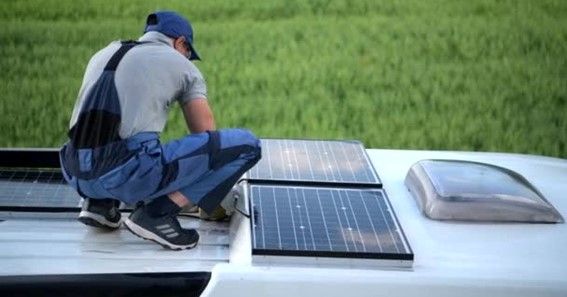Introduction
Solar energy is a clean, renewable resource that has been used to power homes and businesses around the world for centuries. In recent years, it has become increasingly popular due to its environmental benefits and cost savings. Solar energy systems are being installed in more and more places, from residential rooftops to large-scale commercial installations. This article will provide an overview of solar energy and discuss the benefits of commercial solar installation.
Overview of Solar Energy
Solar energy is the direct conversion of sunlight into electricity by capturing photovoltaic cells in solar panels. These cells are made from semiconductor materials such as silicon, which convert sunlight into direct current (DC) electricity that can be used for powering appliances or stored in batteries for later use. Solar panel efficiency varies widely depending on factors such as location, weather conditions, type of system used, and amount of sunlight available during daylight hours.
Click here – Powerful Writing Strategies for Creating Compelling Content
Benefits of Commercial Solar Installation
Commercial solar installation Sydney provides the most efficient and cost-effective solutions for commercial solar installations. There are many advantages to installing a commercial solar system on your business premises:
Cost Savings – Installing a solar system on your business premises can significantly reduce your electricity bills over time. While initial costs may be high due to the purchase price or installation fees involved, long-term savings can be substantial.
Technical Considerations for Any Project
When embarking on any project, there are many technical considerations to be taken into account. Site analysis and preparation, as well as equipment selection and sizing are two of the most important aspects of any project. A thorough approach to these elements can ensure that a project is successful and up to code.
-
Site Analysis and Preparation
Before beginning any project, it’s essential to first analyze the site in order to determine what needs to be done in order for the construction process to run smoothly. This includes researching local regulations, assessing existing infrastructure on site (such as utilities), conducting soil tests for possible contamination or structural issues, surveying boundaries of the property, evaluating access points for trucks/material delivery etc., and identifying environmental concerns that could affect construction plans (such as endangered species habitats). Once all this has been taken into consideration, a plan can then be put together outlining how best to proceed with the project while taking into account any potential safety or legal risks associated with it.
-
Equipment Selection and Sizing
The right equipment must also be selected in order for a building project or renovation job to go off without a hitch. It’s important that you consider both size.
Installation Processes: A Guide to Solar Panel Installation
- Design and Engineering Services
- Grid Connectivity and Permitting Requirements
- Physical Installation of the System Components
Installing solar panels on your property can be a great way to reduce energy costs and help the environment. However, the process of installation is not always easy. It requires careful planning, design and engineering services, grid connectivity and permitting requirements, as well as the physical installation of system components. Here is a guide to help you understand each step involved in the solar panel installation process.
Click here – Develop Your Software Engineering Skill Set
Design and Engineering Services
The first step in installing a solar panel system is to hire a professional engineer or designer who can assess your property’s specifications such as roof size, pitch angle, sun exposure levels etc., determine what type of system best suits your needs and generate an accurate blueprint for the project. This includes selecting appropriate components such as panels and inverters based on current available technology, budget constraints etc. With this data in hand they can create an estimated cost of materials needed for installation along with potential savings from reduced energy bills through careful calculations which will allow you to make an informed decision regarding whether or not it’s worth investing in solar energy at this time.
Maintenance, Repair, Insurance, and Warranties for Commercial Solar Installations
As the demand for renewable energy sources continues to rise, more and more businesses are turning to solar energy as an alternative source of power. Solar energy is becoming increasingly popular due to its cost-effectiveness, environmental sustainability, and reliability. However, while there are many benefits associated with commercial solar installations, they come with a certain set of responsibilities when it comes to maintenance, repair, insurance and warranties.
Maintenance: Regular maintenance is essential for keeping your commercial solar installation running smoothly and optimally. In order to keep your system functioning properly, you should regularly check the wiring connections between all components of the system for signs of corrosion or damage. You should also inspect the physical components such as panels and inverters for signs of wear or damage from weather or other elements. Additionally, you should ensure that all safety features are operational at all times in order to protect personnel working on the installation from potential hazards associated with it.
Repair: If any component of your commercial solar installation fails or breaks down unexpectedly then you will need a professional technician to carry out repairs in order to restore its operation quickly and safely. In some cases parts may need replacing which can be costly but necessary in order maintain optimal performance levels over time.
Conclusion
Commercial solar installation is a great way to reduce energy costs and become more eco-friendly. With the right system design, commercial businesses can save money on their electric bills while also helping to protect the environment. The upfront cost of installing a commercial solar system may be high, but with government incentives and strong return on investment it can be a worthwhile investment for businesses that want to make an environmental impact.
